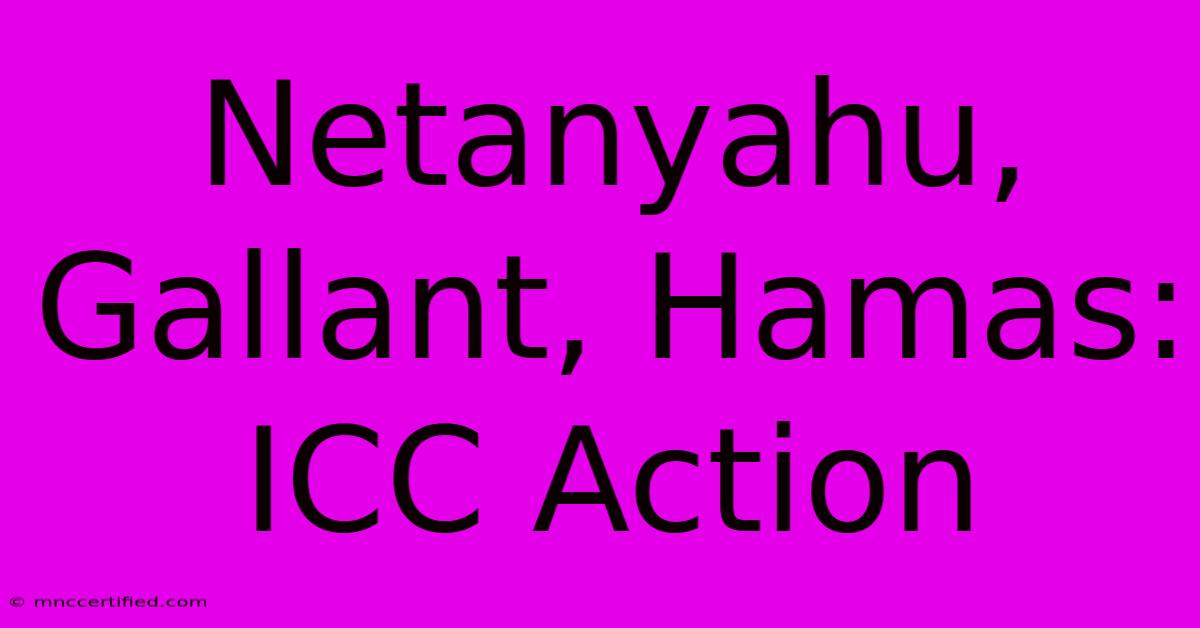Netanyahu, Gallant, Hamas: ICC Action

Table of Contents
Netanyahu, Gallant, and Hamas: The ICC's Shadow Over the Israel-Gaza Conflict
The recent escalation of violence between Israel and Hamas has cast a long shadow, reaching far beyond the immediate battlefield. The International Criminal Court (ICC) is now actively considering investigations into potential war crimes committed by all parties involved, placing Israeli Prime Minister Benjamin Netanyahu, Defense Minister Yoav Gallant, and Hamas leaders squarely in the spotlight. This article delves into the complexities of the ICC's involvement, exploring the potential legal ramifications for key figures and the broader geopolitical implications.
The ICC's Jurisdiction and the Israel-Gaza Conflict
The ICC's jurisdiction is a contentious issue. While Palestine is a state party to the Rome Statute (the treaty establishing the ICC), Israel is not. However, the ICC's Pre-Trial Chamber has asserted jurisdiction based on Palestine's declaration of acceptance of the Court's jurisdiction. This assertion has been met with strong opposition from Israel, which argues the ICC lacks authority to investigate actions within its territory.
The ICC's investigation focuses on alleged war crimes and crimes against humanity committed during the conflict, including:
- Targeting of civilians: Both Israeli airstrikes and Hamas rocket attacks have resulted in significant civilian casualties, raising concerns about violations of the laws of war. The ICC will meticulously examine the proportionality and necessity of military actions taken by both sides.
- Use of disproportionate force: The investigation will scrutinize whether the force used by both sides was excessive in relation to the military objective. This includes examining the potential targeting of civilian infrastructure and the use of weapons that may cause indiscriminate harm.
- War crimes committed by Hamas: The ICC is also investigating alleged war crimes committed by Hamas, including the taking of hostages and the use of human shields. This element emphasizes that the investigation is not one-sided and aims to hold all parties accountable.
- Potential Crimes Against Humanity: The scale and systematic nature of the violence could lead to charges of crimes against humanity, alleging widespread or systematic attacks against a civilian population.
Netanyahu and Gallant: Potential Legal Exposure?
The ICC investigation presents a significant challenge to the Israeli leadership. While the ICC's jurisdiction remains disputed by Israel, any potential indictment of Prime Minister Netanyahu or Defense Minister Gallant would be a landmark event, carrying considerable international political consequences. The investigation will examine their roles in authorizing and overseeing military operations, focusing on whether they adhered to international humanitarian law. Allegations of potential war crimes against them hinge on evidence proving intent, knowledge, or reckless disregard for civilian lives.
The complexity of command responsibility makes proving guilt challenging. The ICC must demonstrate a clear chain of command and evidence of direct or indirect involvement in the alleged crimes.
Hamas Leadership: Facing Accountability
The ICC is also examining alleged war crimes committed by Hamas. This includes accusations of targeting civilians, using human shields, and the unlawful detention and execution of hostages. The investigation will seek to identify and hold accountable those responsible for these atrocities. Hamas's leadership faces serious potential legal repercussions, regardless of the outcome of the Israel-Palestine conflict.
Geopolitical Implications and International Response
The ICC's involvement is highly sensitive and has profound geopolitical implications. Israel's strong opposition to the investigation has exacerbated tensions with international partners. The investigation underscores the need for accountability in armed conflict and serves as a reminder of the importance of upholding international humanitarian law. The international community's response will be crucial in shaping the trajectory of the investigation and determining whether the outcome will contribute to future conflict resolution or further inflame tensions. The potential for political backlash and diplomatic consequences is considerable.
Conclusion: A Path Towards Justice or Further Polarization?
The ICC's investigation into the Israel-Gaza conflict is a complex and multifaceted process with potentially far-reaching consequences. While aiming for accountability, the process itself risks further polarizing the already tense situation. The outcome of the investigation, regardless of its findings, will have a lasting impact on the Israeli-Palestinian conflict and the broader application of international criminal law. The pursuit of justice must be carefully balanced with efforts to promote peace and reconciliation. The road ahead is paved with challenges, and the international community must navigate this delicate situation with caution and a commitment to justice for all victims.

Thank you for visiting our website wich cover about Netanyahu, Gallant, Hamas: ICC Action. We hope the information provided has been useful to you. Feel free to contact us if you have any questions or need further assistance. See you next time and dont miss to bookmark.
Featured Posts
-
Illinois Court Overturns Smollett Verdict
Nov 22, 2024
-
Sorority Life Penn State Student Journey
Nov 22, 2024
-
2025 Qb Lewis Joins Deion Sanders
Nov 22, 2024
-
Brightway Insurance Charlotte Nc
Nov 22, 2024
-
Unison Remembers John Prescott
Nov 22, 2024